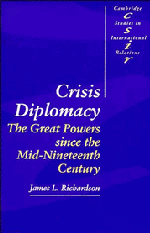Book contents
- Frontmatter
- Contents
- List of tables
- Acknowledgments
- I PART I
- PART II
- PART III
- 10 Crises and the international system: arenas, alignments and norms
- 11 The choice of goals: values, interests and objectives
- 12 Selective perception and misperception
- 13 Crisis bargaining
- 14 Internal politics
- 15 The outcome and the risk of war
- PART IV
- Notes
- Select bibliography
- Index
- CAMBRIDGE STUDIES IN INTERNATIONAL RELATIONS
11 - The choice of goals: values, interests and objectives
Published online by Cambridge University Press: 03 May 2011
- Frontmatter
- Contents
- List of tables
- Acknowledgments
- I PART I
- PART II
- PART III
- 10 Crises and the international system: arenas, alignments and norms
- 11 The choice of goals: values, interests and objectives
- 12 Selective perception and misperception
- 13 Crisis bargaining
- 14 Internal politics
- 15 The outcome and the risk of war
- PART IV
- Notes
- Select bibliography
- Index
- CAMBRIDGE STUDIES IN INTERNATIONAL RELATIONS
Summary
The case studies suggest that, in general, crisis diplomacy is an intentional, goal-seeking form of behaviour, the pursuit of policies or strategies aimed at achieving certain ends or avoiding certain outcomes. Yet the study of goals, and in particular their rationales and the processes by which they are chosen, is a neglected area of crisis research. They are often taken for granted, or treated as ‘givens’, and are seldom studied in depth. They are presupposed in the bargaining approach, and largely submerged in analyses of stress or the hostility spiral. This chapter makes neither kind of assumption, but treats the extent to which crisis behaviour is goal-driven as a question to be investigated.
One approach to the discussion of goals, that of formal rationalchoice theory, borrows its key concepts – utilities and preferences – from economics and game theory. Some problems in applying formal theory to foreign policy decisions were noted in Chapter 2, above. The present chapter will follow a different approach, one which is closer to the terminology used by the actors, and which allows for the heterogeneity of goals, and for the difficulty and stress in choosing among core values under conditions of uncertainty – problems which are assumed away by the concept of maximising utility. It will seek to develop what was earlier termed an informal rational-choice theory, that is to say, a systematic analysis of goals and their rationales, in a way which is more concrete and differentiated than the abstractions of utility maximising.
- Type
- Chapter
- Information
- Crisis DiplomacyThe Great Powers since the Mid-Nineteenth Century, pp. 236 - 254Publisher: Cambridge University PressPrint publication year: 1994

